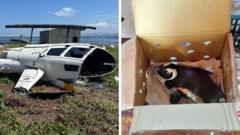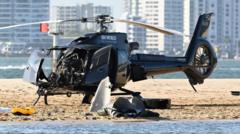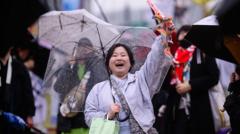A series of warnings went unaddressed by Muan International Airport officials leading up to the tragic crash of Jeju Air Flight 2216, which took the lives of 179. Investigators found evidence of bird strikes, raising significant questions about airport safety protocols.
Repeated Bird Strike Warnings Ignored Before Tragic Jeju Air Crash

Repeated Bird Strike Warnings Ignored Before Tragic Jeju Air Crash
Investigative findings reveal that Muan International Airport operators neglected multiple warnings regarding bird strikes preceding the fatal Jeju Air Flight 2216 incident.
In December 2025, South Korea's air travel faced a grave incident when Jeju Air Flight 2216 crashed at Muan International Airport, leading to 179 fatalities. Investigators have uncovered extensive documentation revealing that airport officials had received numerous alerts concerning bird strikes within the weeks leading up to the catastrophe. In a meeting just ten days before the crash, officials discussed a considerable rise in bird strike incidents but stalled any effective response.
An aviation training expert at the meeting pointed out growing concerns over flocks of birds frequenting the coastal approach to the airport, yet no substantial measures were undertaken to mitigate the danger. Officials lamented insufficient resources, claiming their efforts to deploy personnel and equipment to deter birds were inadequate.
The dire need for improved bird strike prevention became painfully clear when the pilot of Jeju Air Flight 2216 declared a Mayday distress call, reporting a bird strike while descending for landing. The aircraft ultimately crash-landed, resulting in a fiery explosion and tragic loss of life.
Authorities later recovered bird feathers and blood from the engines, linking the incident to Baikal teals, a migratory duck species. The frequency of bird strikes near Muan Airport has raised pressing questions about aviation safety policies and the adherence to preventive measures that could have avert such an avoidable tragedy.
An aviation training expert at the meeting pointed out growing concerns over flocks of birds frequenting the coastal approach to the airport, yet no substantial measures were undertaken to mitigate the danger. Officials lamented insufficient resources, claiming their efforts to deploy personnel and equipment to deter birds were inadequate.
The dire need for improved bird strike prevention became painfully clear when the pilot of Jeju Air Flight 2216 declared a Mayday distress call, reporting a bird strike while descending for landing. The aircraft ultimately crash-landed, resulting in a fiery explosion and tragic loss of life.
Authorities later recovered bird feathers and blood from the engines, linking the incident to Baikal teals, a migratory duck species. The frequency of bird strikes near Muan Airport has raised pressing questions about aviation safety policies and the adherence to preventive measures that could have avert such an avoidable tragedy.



















